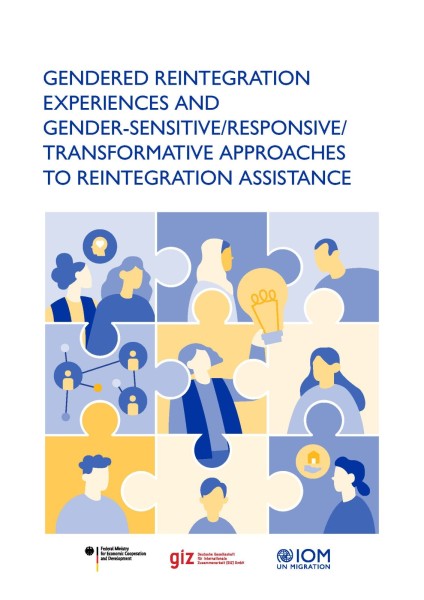Gendered Reintegration Experiences and Gender-Sensitive/Responsive/Transformative Approaches to Reintegration Assistance

Research analysing the multidimensional aspects that define the process of return and reintegration through a gender perspective continues to be very limited. Moreover, there are multiple challenges, including protection concerns, linked to the collection of gender disaggregated data. This has repercussions for policies and programmes targeting return of migrants and their reintegration. Considering that more data and evidence are needed to generate programmatic recommendations and improve existing reintegration assistance and services, this study has the overarching objective of providing new knowledge and information on gendered experiences of return and reintegration and ultimately to make recommendations for more gender-sensitive/gender-responsive programmes and policies for reintegration assistance.
The research findings showed the impacts of dangerous and often violent migration journeys on return and reintegration processes, with many returnees expressing severe psychological impacts upon returning to their countries of origin. Moreover, many expressed that their return was a result of constrained options, which subsequently led to feelings of failure. Despite the limitations of the research in gathering gender-disaggregated information, particularly from returnees with diverse SOGIESC, as highlighted above, the findings reflect the effects of gender inequality during the reintegration process. They show that independently of their gender, returnees are frequently stigmatized and discriminated by their families and local communities. Nonetheless, these forms of prejudicial treatments were experienced in gendered ways by returnees, and inflicted because of traditional gender-binary roles (i.e. men not brining economic gains from their migration, women being victims of sexual violence, etc.). The findings of the research bring to light specific challenges for single parents, specifically single mothers, who faced stigma and discrimination along with their children.
The study was carried out by IOM and Jane Freedman in five case study countries – the Gambia, Ghana, Guinea, Serbia and Tunisia – and It was made possible with the support of the Deutsche Gesellschaft für Internationale Zusammenarbeit (GIZ) GmbH on behalf of the German Federal Ministry for Economic Cooperation and Development (BMZ).
| Pièce jointe | Taille |
|---|---|
| Download | 6.19 Mo |
